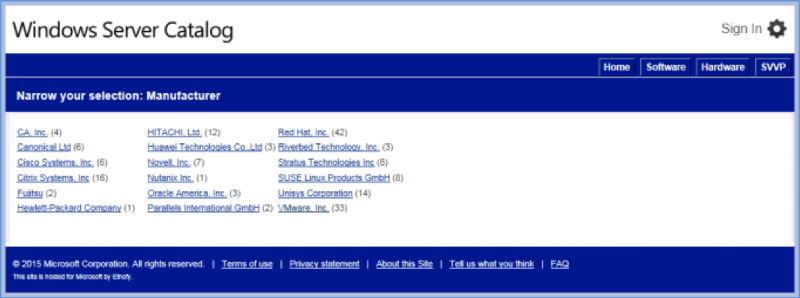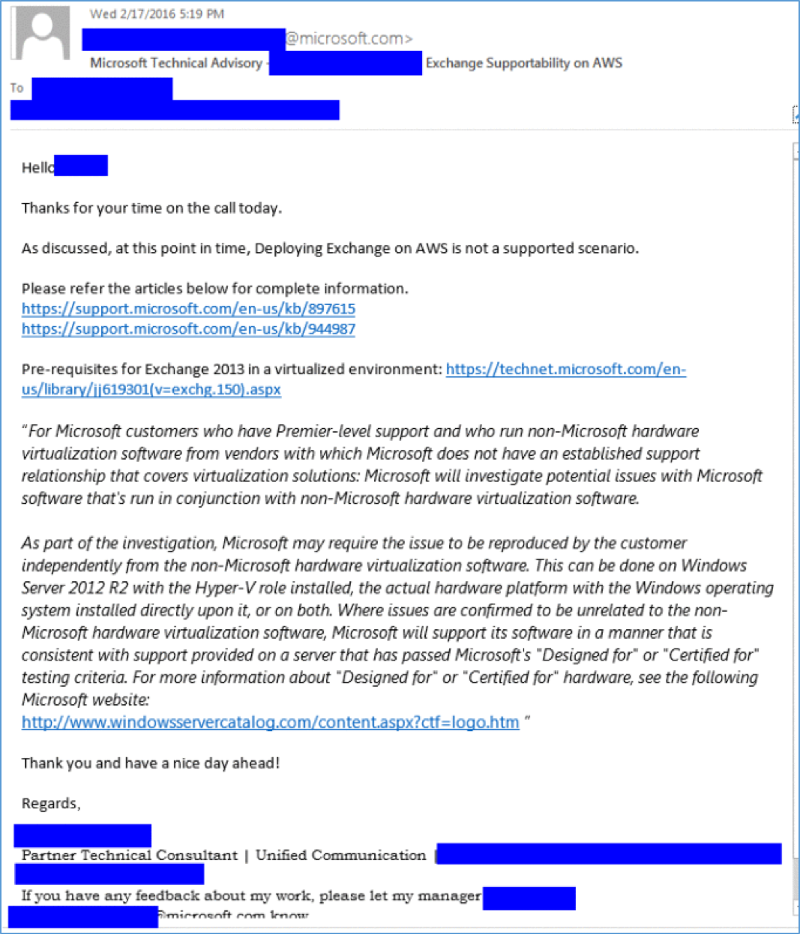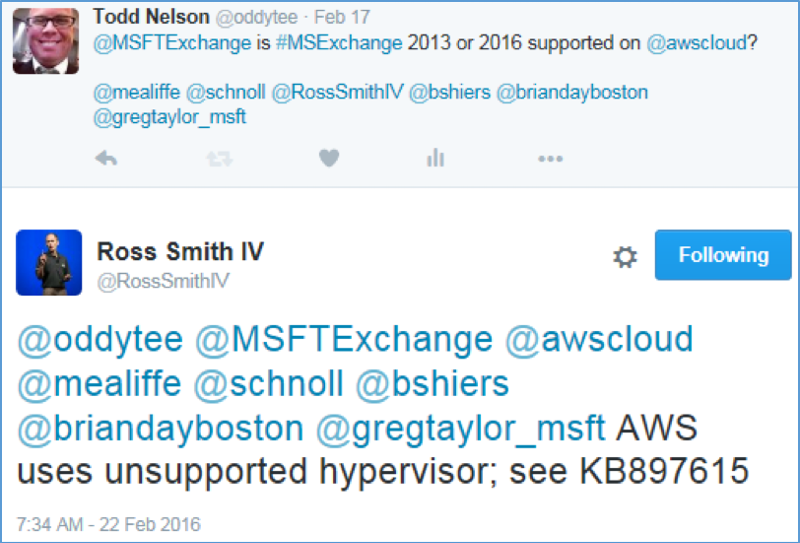Browse All Articles > Is Exchange Server Supported in Amazon Web Services?
Exchange server is not supported in any cloud-hosted platform (other than Azure with Azure Premium Storage).
Is Microsoft Exchange Server supported in third-party cloud-based hosted platforms? More specifically, is Exchange support in Amazon Web Services (AWS)?
The short answer to this question is, "It depends." It depends on who you ask, and what kind of support you expect to receive and from whom.
I was recently involved in a pre-sales discussion where there was heavy pressure to implement Exchange on AWS, VMware vCloud, and other non-Microsoft cloud-hosted hypervisors. As a result of that conversation, and being a Microsoft Partner, I did some research to see if, in fact, Exchange is or is not supported on AWS.
Basically, specific information from Microsoft is difficult to come by. But here are a few references...
When reading through these references, I found varying thoughts, comments, and opinions. Tony Redmond states Microsoft is not supporting it--but he alludes to a future possibility. AWS and VMware imply they currently support it. And for some of those in the community, it seems to be a hot button topic where chips are falling on both sides of the fence; but maybe not important enough for Microsoft to start supporting any time soon--just like Exchange on NFS {poke} {poke}.
Good enough, right? No! For me, I wasn't satisfied with any of the information I read and was determined to find out from the horse's mouth what I'm supposed to do if I have to contact Microsoft for support.
A vendor specific search brought me to the Windows Server Virtualization Validation Program site where I took a look at the Products Listing by vendor. And as I looked closely, several vendors are listed, however Amazon is not. That indicates to me AWS is not a supported server virtualization platform for Exchange, or any of Microsoft's products for that matter.
![aws1.png]()
Additionally, when selecting each vendor I found out which of their specific products are a supported server virtualization platform. Using VMware as an example, I found that all of the on premise hypervisors are supported, however vCloud is not listed. So, the assumption is that it is not a supported platform for any of Microsoft's products either.
I wanted to know more. As a Microsoft partner, I need to provide supported solutions to customers and tread lightly when it comes to potential unsupported configurations. Therefore, I contacted the Microsoft Technical Advisory team in an effort to get an "official" support stance that Microsoft will take in the event Exchange is deployed in AWS and I ever need to open an incident with them. After a brief conversation, I received the following email from the advisor...
![aws2.png]()
In addition, I asked some of the Exchange team brain trust the same question I made to the technical consultant…
![aws3.png]()
SUPPORT STANCE FOR NON-MICROSOFT PRODUCTS
Between the email from the technical consultant and the Twitter response from Ross Smith, there are a few references that we need to look at more closely...
Microsoft provides a specific list of support partners for virtualization...
SUPPORT ON AZURE
Well if Exchange doesn't appear to be supported in AWS, is Exchange supported in Microsoft Azure?
These references in TechNet states that Exchange 2013 and 2016 are supported on Azure with a big caveat that the volumes for the databases and transaction logs are set up on Azure Premium Storage. But it does not appear that Exchange 2010 is supported on Azure based on the lack of information found.
Azure Premium Storage uses solid state drives (SSD) instead of spindles (HDD) used for Azure Standard Storage for higher performance and reliability. Pricing for Azure Premium Storage varies based on the disk size selected; which ranges from ~$22 to ~$149 per month (as of July 2015).
CONCLUSION
Back to the original question ... Is Exchange supported in Amazon Web Services? Again, it depends. If we look to Microsoft to provide support, then the answer is a resounding 'no'. For my money, I personally would never implement any vendor products, in production, on an unsupported platform--which is the case for cloud-based hosted platforms when it comes to Exchange. But, for the cost of it, even though it is supported, I wouldn't implement Exchange in Azure either unless there is a compelling reason to do so.
When speaking with a colleague about why MS won't support Exchange in AWS, they put it like this ... "You can by a Ford and put a Chevy engine in it but how can Ford honor the warranty when it's taken in for repairs."
If we are willing to risk receiving support from the software developer for convenience (and maybe some cost savings) then we (as implementers) will be the ones liable for having to support the solution. And, I don't have that kind of time. Do you?
The short answer to this question is, "It depends." It depends on who you ask, and what kind of support you expect to receive and from whom.
I was recently involved in a pre-sales discussion where there was heavy pressure to implement Exchange on AWS, VMware vCloud, and other non-Microsoft cloud-hosted hypervisors. As a result of that conversation, and being a Microsoft Partner, I did some research to see if, in fact, Exchange is or is not supported on AWS.
Basically, specific information from Microsoft is difficult to come by. But here are a few references...
- Running Exchange 2013 on Amazon Web Services (Tony Redmond)
- Microsoft Exchange Server 2013 on AWS (Amazon Web Services)
- Why Run Your Exchange Environment In A Hybrid Cloud Model? (VMware)
- Will Microsoft Exchange Server support help me if I have a AWS environment?
When reading through these references, I found varying thoughts, comments, and opinions. Tony Redmond states Microsoft is not supporting it--but he alludes to a future possibility. AWS and VMware imply they currently support it. And for some of those in the community, it seems to be a hot button topic where chips are falling on both sides of the fence; but maybe not important enough for Microsoft to start supporting any time soon--just like Exchange on NFS {poke} {poke}.
Good enough, right? No! For me, I wasn't satisfied with any of the information I read and was determined to find out from the horse's mouth what I'm supposed to do if I have to contact Microsoft for support.
A vendor specific search brought me to the Windows Server Virtualization Validation Program site where I took a look at the Products Listing by vendor. And as I looked closely, several vendors are listed, however Amazon is not. That indicates to me AWS is not a supported server virtualization platform for Exchange, or any of Microsoft's products for that matter.

Additionally, when selecting each vendor I found out which of their specific products are a supported server virtualization platform. Using VMware as an example, I found that all of the on premise hypervisors are supported, however vCloud is not listed. So, the assumption is that it is not a supported platform for any of Microsoft's products either.
I wanted to know more. As a Microsoft partner, I need to provide supported solutions to customers and tread lightly when it comes to potential unsupported configurations. Therefore, I contacted the Microsoft Technical Advisory team in an effort to get an "official" support stance that Microsoft will take in the event Exchange is deployed in AWS and I ever need to open an incident with them. After a brief conversation, I received the following email from the advisor...

In addition, I asked some of the Exchange team brain trust the same question I made to the technical consultant…

SUPPORT STANCE FOR NON-MICROSOFT PRODUCTS
Between the email from the technical consultant and the Twitter response from Ross Smith, there are a few references that we need to look at more closely...
“For Microsoft customers who have Premier-level support and who run non-Microsoft hardware virtualization software from vendors with which Microsoft does not have an established support relationship that covers virtualization solutions: Microsoft will investigate potential issues with Microsoft software that's run in conjunction with non-Microsoft hardware virtualization software.
As part of the investigation, Microsoft may require the issue to be reproduced by the customer independently from the non-Microsoft hardware virtualization software. This can be done on Windows Server 2012 R2 with the Hyper-V role installed, the actual hardware platform with the Windows operating system installed directly upon it, or on both. Where issues are confirmed to be unrelated to the non-Microsoft hardware virtualization software, Microsoft will support its software in a manner that is consistent with support provided on a server that has passed Microsoft's "Designed for" or "Certified for" testing criteria. For more information about "Designed for" or "Certified for" hardware, see the following Microsoft website: http://www.windowsservercatalog.com/content.aspx?ctf=logo.htm “
Microsoft provides a specific list of support partners for virtualization...
Microsoft has established a joint support relationship for non-Microsoft hardware virtualization software with the following vendors:
- Cisco Systems, Inc.
- Citrix Systems, Inc.
- Novell, Inc.
- Oracle, USA Inc.
- Sun Microsystems
- Unisys Corp.
- Virtual Iron Software
- VMware, Inc.
SUPPORT ON AZURE
Well if Exchange doesn't appear to be supported in AWS, is Exchange supported in Microsoft Azure?
These references in TechNet states that Exchange 2013 and 2016 are supported on Azure with a big caveat that the volumes for the databases and transaction logs are set up on Azure Premium Storage. But it does not appear that Exchange 2010 is supported on Azure based on the lack of information found.
- Exchange 2013 virtualization: Requirements for hardware virtualization
- Exchange 2016 virtualization: Requirements for hardware virtualization
NOTE: Deployment of Exchange 2013 [and Exchange 2016] on Infrastructure-as-a-Service (IaaS) providers is supported if all supportability requirements are met. In the case of providers who are provisioning virtual machines, these requirements include ensuring that the hypervisor being used for Exchange virtual machines is fully supported, and that the infrastructure to be utilized by Exchange meets the performance requirements that were determined during the sizing process. Deployment on Microsoft Azure virtual machines is supported if all storage volumes used for Exchange databases and database transaction logs (including transport databases) are configured for Azure Premium Storage.
Azure Premium Storage uses solid state drives (SSD) instead of spindles (HDD) used for Azure Standard Storage for higher performance and reliability. Pricing for Azure Premium Storage varies based on the disk size selected; which ranges from ~$22 to ~$149 per month (as of July 2015).
CONCLUSION
Back to the original question ... Is Exchange supported in Amazon Web Services? Again, it depends. If we look to Microsoft to provide support, then the answer is a resounding 'no'. For my money, I personally would never implement any vendor products, in production, on an unsupported platform--which is the case for cloud-based hosted platforms when it comes to Exchange. But, for the cost of it, even though it is supported, I wouldn't implement Exchange in Azure either unless there is a compelling reason to do so.
When speaking with a colleague about why MS won't support Exchange in AWS, they put it like this ... "You can by a Ford and put a Chevy engine in it but how can Ford honor the warranty when it's taken in for repairs."
If we are willing to risk receiving support from the software developer for convenience (and maybe some cost savings) then we (as implementers) will be the ones liable for having to support the solution. And, I don't have that kind of time. Do you?
Have a question about something in this article? You can receive help directly from the article author. Sign up for a free trial to get started.


Comments (0)